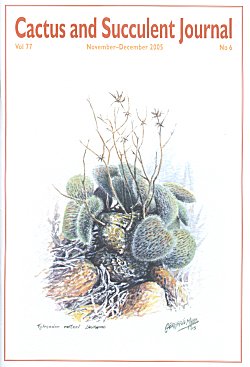

| CSSA VOL.77, November-December 2005 No.6 | |
|---|
| Under Discussion Thelocactus | Fred Dortort |
| Succulent and xeromorphic bromeliads of Brazil Part 1 Dyckia marnier-lapostollei L. B. Smith | Pierre J Braun & Eddie Esteves Pereira |
| From Prickly Pear to Dragon Fruit The changing face of cactus-fruit growing | Gavin Hart |
| Glass Cacti | D Russell Wagner |
Nevadagascar? The threat that invasive weeds and wild-fires pose to our North American desert biomes
Part 1: The Mojave Desert and Joshua Tree woodlands | Jan Emming |
| The rediscovery of Aloe fimbrialis and an amplified description | Graham Williamson |
| Succulents on Stamps Asclepiads, Part 2 | Peg Spaete |
| Volume 77 Index |
|
On the cover. Gerhard Marx's cover painting depicts Tylecodon nolteei Lavranos, a beautiful dwarf species endemic to a small area in the middle of the Knersvlakte in the winter rainfall region of South Africa. Flattish marbled leaves distinguish it from T.occultans, which has deep green, pillow-like leaves, completely unmarked and (usually) only sparsely fuzzy.
Tylecodon occultans is known from Bitterfontein and Komkans, points lying north and west of T.nolteei's habitats.
We know two of the latter: the type locality-shaded rocky shelflets on the crest of a shale hill near Rooiberg-and the flats around Grootgraafwater to the south. Plants in the flats experience a harsher exposition and are permanently stunted, so much so that they are essentially stemless and in that respect resemble the potato-like T. occultons, with which they have often been confused. The stem-forming T.nolteei grown and painted by Marx is from the type locality. Plants at that locality vary from a vague mottling to full Gorbachevian birthmarks; the glistening green markings also vary from year to year. The flowers, however, are stable, with red candy stripes on the outside of their ivory corolla-tubes. Plants flower in summer and shed seed by early autumn. |  |
|
|



